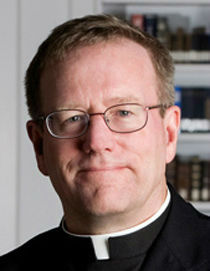
Spirituality
. . . When even the direct taking of innocent life is a matter of personal choice, the entire moral enterprise has in fact collapsed into incoherence.

Barron
When I was an auxiliary bishop in the Los Angeles Archdiocese some years ago, the state of California was militating in favor of physician-assisted suicide. During the campaign, while driving through my pastoral region, I saw a pro-euthanasia billboard with the following message: "My Life, my Death, my Choice." Immediately, I thought of St. Paul's diametrically opposite remark in his Letter to the Romans: "We do not live to ourselves, and we do not die to ourselves. If we live, we live to the Lord, and if we die, we die to the Lord; so then, whether we live or whether we die, we are the Lord's." I do believe that in regard to the issue of assisted suicide, it comes down to this: Did the billboard get it right, or did St. Paul? Does my life belong to me, or is it a gift from God? Is my death a matter of my personal choice, or is it under God's providence and at his disposal?
This great question has come to the forefront of my mind once again, since my current home state of Minnesota is considering legislation very similar to the one that California did indeed adopt. The proposal is couched in language designed to assuage moral anxieties: it will be offered only to those who have a terminal diagnosis and who are making the decision in complete autonomy. In regard to the first point, color me very skeptical. In many countries in Europe and in Canada, where physician-assisted suicide was approved in a similarly limited way, the restrictions on who can access it and the safeguards in place to prevent elder abuse, among other things, have been gradually lifted. In many of those places, the elderly, those with dementia, those experiencing depression or severe anxiety can all be candidates for this form of "treatment." Though the advocates of medically assisted suicide will deny it until the cows come home, this law places the entire state directly on the slipperiest of slopes.
And in regard to the second point, we're back to the California billboard. Though we place a huge premium on it in our culture, I don't consider autonomy the supreme value. Authentic freedom is not radical self-determination; rather, it is ordered to certain goods that the mind has discerned. I become free, for instance, to play golf, not inasmuch as I swing the club any way I want, but instead in the measure that I have interiorized the rules that properly govern the swing. A purely "autonomous" golfer will be a failure on the course. In precisely the same way, a sheerly autonomous moral agent will wreak havoc all around him and lose his ethical bearings. If I speak obsessively of "choice" but never even raise a question regarding the good or evil being chosen, I find myself in a moral and intellectual wasteland. True freedom is ordered toward moral value and ultimately to the supreme value who is God.
Some advocates of physician-assisted suicide will argue that autonomy over one's body is of utmost importance for those who face the prospect of a dreadfully painful demise. But this consideration is largely beside the point, for palliative care is so advanced that in practically all cases, pain can be successfully managed. I say this with special emphasis in the state of Minnesota, which is justly famous for the high quality of its hospitals, including and especially the Mayo Clinic. The deeper point is this: even if a dying person found himself in great pain, actively killing himself would not be morally justifiable. The reason is that the direct killing of the innocent is, in the language of the Church, "intrinsically evil" -- which is to say, incapable of being morally sanctioned, no matter how extenuating the circumstances or how beneficial the consequences. I have argued before that when this category is lost sight of a dangerous relativism holds sway. And when even the direct taking of innocent life is a matter of personal choice, the entire moral enterprise has in fact collapsed into incoherence.
And so, could I ask all of my fellow citizens of Minnesota, especially those who are Catholic, to oppose this legislation (SF 1813/HF 1930) in any way you can: call your representative or senator, write to the governor, talk to your friends and neighbors, circulate a petition. And to those in other parts of the country, I would urge vigilance. If this legislation hasn't come to your state yet, it probably will soon enough. If you stand for the culture of life, fight it!
- Bishop Robert Barron is the founder of the global ministry, Word on Fire, and is Bishop of the Diocese of Winona-Rochester.
Recent articles in the Spirituality section
-
Pushed off the platformMichael Pakaluk
-
Advice to fathersMichael Pakaluk
-
The higher you go liturgically, the lower you should go in service of the poorBishop Robert Barron
-
The Easter Season is the fleshly seasonMichael Pakaluk
-
Ripley and RupnikEffie Caldarola


















